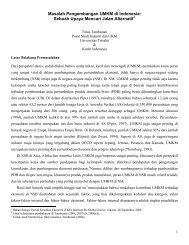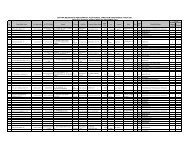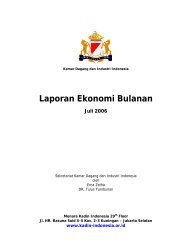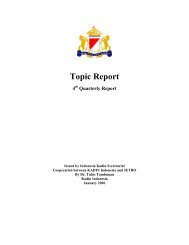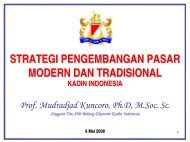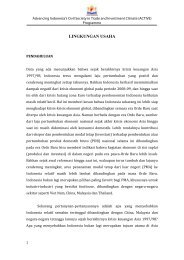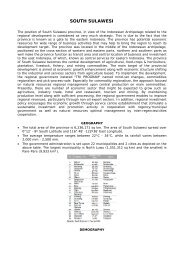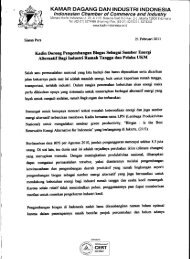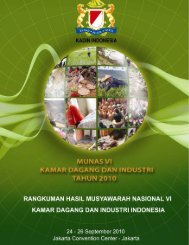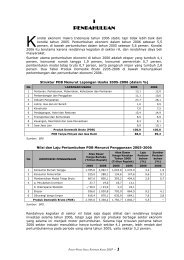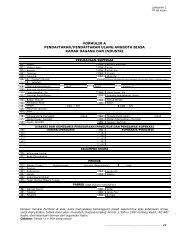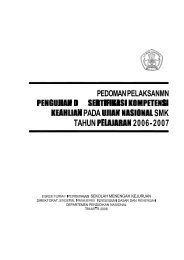Global Economic Outlook and Strategy - Kadin Indonesia
Global Economic Outlook and Strategy - Kadin Indonesia
Global Economic Outlook and Strategy - Kadin Indonesia
Create successful ePaper yourself
Turn your PDF publications into a flip-book with our unique Google optimized e-Paper software.
February 28, 2008<br />
<strong>Global</strong> <strong>Economic</strong> <strong>Outlook</strong> <strong>and</strong> <strong>Strategy</strong><br />
The change in BoJ<br />
leadership will not alter<br />
policy.<br />
Rising commodity prices<br />
have helped some<br />
industrial economies.<br />
Strong fundamentals have<br />
insulated some emerging<br />
economies...<br />
...from deteriorating global<br />
growth.<br />
government’s economic policies — namely, the enforcement of the revised Building<br />
St<strong>and</strong>ard Law <strong>and</strong> tax <strong>and</strong> social security burden hikes for the household sector — will<br />
diminish meaningfully or even reverse in 2008. Finally, financial conditions remain<br />
much more favorable than in other industrialized countries as damages to banks’ capital<br />
from subprime mortgage-related structured products have been limited.<br />
Bank of Japan (BoJ) Governor Fukui will leave office on March 19. The government is<br />
scheduled to announce its proposal for the next governor <strong>and</strong> two deputy governors<br />
next week. Press reports suggest that Mr. Toshiro Muto, a current deputy governor, is<br />
likely to be nominated to replace Mr. Fukui. The basic thrust of monetary policy (that<br />
is, gradual rate hikes to more normal levels) will likely remain largely intact. While<br />
uncertainties surrounding the U.S. economy <strong>and</strong> global financial markets will likely<br />
continue to dissuade the BoJ from hiking rates until around the turn of this year, the<br />
next policy action will probably be a rate hike unless the domestic economy slows<br />
much more sharply than we now expect.<br />
Strong Commodities Dem<strong>and</strong> Is Boosting Some Industrial Countries<br />
In contrast to developments in the major industrial economies, economic growth has<br />
remained resilient in a number of smaller industrialized economies that principally are<br />
leveraged to the boom in commodity prices, such as Australia. Indeed, many<br />
commodity prices have continued to rise this year, especially energy-related<br />
commodities, iron ore, food, <strong>and</strong> some base metals, despite the marking down of<br />
prospects for global economic growth. The strength of commodity prices reflects<br />
ongoing supply bottlenecks <strong>and</strong> still rampant dem<strong>and</strong> in China <strong>and</strong> emerging<br />
economies generally. Against this backdrop, a deteriorating outlook for inflation forced<br />
both the Reserve Bank of Australia <strong>and</strong> the Riksbank to raise official interest rates in<br />
February, <strong>and</strong> we expect more monetary policy tightening in Australia <strong>and</strong> Norway,<br />
while the Reserve Bank of New Zeal<strong>and</strong> is likely to maintain a tightening bias this year.<br />
Strong Fundamentals Are Bolstering Many Emerging Economies...<br />
Strong economic growth is likely to continue in emerging Asia, despite the weakening<br />
of the U.S. economy. However, Asia’s resilient growth is not because it has decoupled<br />
from the United States, but because it enjoys greater policy flexibility from improved<br />
macroeconomic fundamentals. China is likely to step up public-sector dominated<br />
spending on infrastructure <strong>and</strong> the resource sectors in the face of slowing exports. This<br />
could also happen in many other economies, including Korea, Hong Kong, Singapore,<br />
Thail<strong>and</strong>, the Philippines, <strong>and</strong> even <strong>Indonesia</strong>. This implies that, in the short term,<br />
while headline growth could moderate, Asian economies could become more dependent<br />
on investment. As a result, commodity dem<strong>and</strong> intensity could increase.<br />
Deteriorating global prospects, especially in the major economies, have so far had only<br />
a modest impact on Latin American economies. Growth remains generally strong,<br />
although somewhat slower than in 2007, <strong>and</strong> should remain above trend with a regional<br />
average of 4.4% for 2008. After a temporary selloff, currencies have strengthened, with<br />
the Brazilian real, Peruvian sol, <strong>and</strong> Colombian <strong>and</strong> Chilean pesos making new highs<br />
against the U.S. dollar in recent weeks.<br />
China will appoint its new government for the next five years at the National People’s<br />
Congress meetings starting March 5. A new president just took office in Korea. In<br />
general, we do not expect these political changes to have a significant impact on<br />
7



